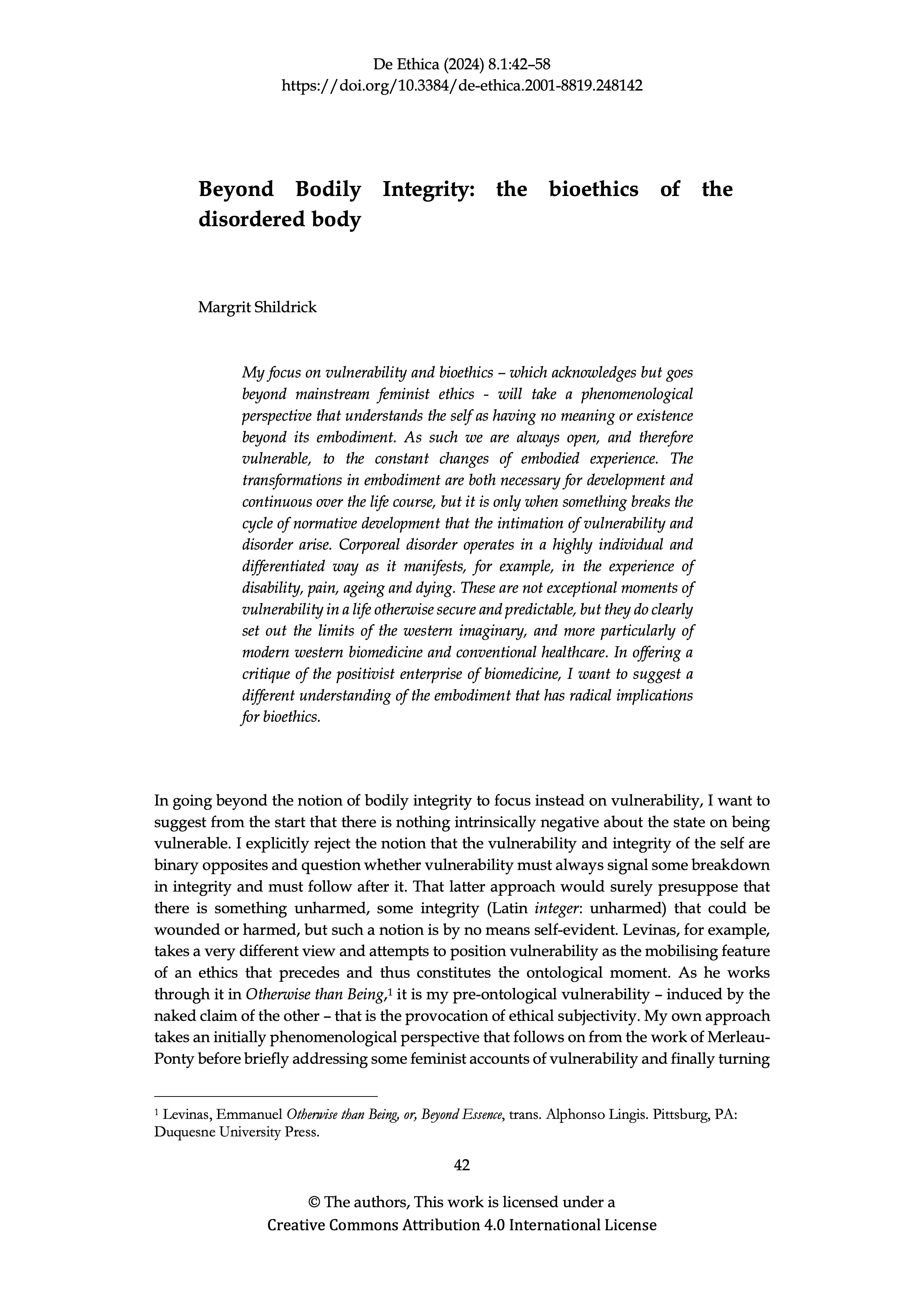Beyond Bodily Integrity
the bioethics of the disordered body
DOI:
https://doi.org/10.3384/de-ethica.2001-8819.248142Keywords:
Vulnerability, Bioethics, Phenomenology, Embodiment, Death, Disability, DyingAbstract
My focus on vulnerability and bioethics – which acknowledges but goes beyond mainstream feminist ethics - will take a phenomenological perspective that understands the self as having no meaning or existence beyond its embodiment. As such we are always open, and therefore vulnerable, to the constant changes of embodied experience. The transformations in embodiment are both necessary for development and continuous over the life course, but it is only when something breaks the cycle of normative development that the intimation of vulnerability and disorder arise. Corporeal disorder operates in a highly individual and differentiated way as it manifests, for example, in the experience of disability, pain, ageing and dying. These are not exceptional moments of vulnerability in a life otherwise secure and predictable, but they do clearly set out the limits of the western imaginary, and more particularly of modern western biomedicine and conventional healthcare. In offering a critique of the positivist enterprise of biomedicine, I want to suggest a different understanding of the embodiment that has radical implications for bioethics.
References
Adams R (2017) ‘Disability Life Writing and the Problem of Dependency in The Autobiography of Gaby Brimmer’, Journal of Medical Humanities 38(1):39-50.
Barcaro, Rosangela, Martina Mazzoleni and Paolo Virgili (2018) “Ethics of Care and Robot Caregivers.” Prolegomena 17 (1): 71–80.
Beauvoir, Simone de (1965) A Very Easy Death. New York: Pantheon Books.
(1968) Force of Circumstance. Harmondsworth: Penguin.
(1972) Old Age. London: Andre Deutsch and Weidenfeld and Nicholson.
Bishop, Jeffrey (2011) The Anticipatory Corpse: Medicine, Power, and the Care of the Dying. Notre Dame, IN: University of Notre Dame Press.
Brannelly Tula (2011) ‘Sustaining citizenship: People with dementia and the phenomenon of social death’, Nursing Ethics.;18 (5): 662-671.
Brison, Susan J. (1997) ‘Outliving Oneself: Trauma, Memory and Personal Identity’ in Diana Tietjens Meyers (ed.) Feminists Rethink the Self. Boulder, CO: Westview Press.
Brown, Nik and Andrew Webster (2004) New Medical Technologies and Society: Reordering Life. Cambridge: Polity Press.
Butler, Judith (2006) Precarious Life: The Power of Mourning and Violence. London: Verso.
(2014) ‘Bodily Vulnerability, Coalitions, and Street Politics’, Critical Studies, 37: 99–119.
Calo C.J., N. Hunt-Bull, L. Lewis et al. (2011) ‘Ethical Implications of using the Paro Robot’, AAAI Workshop WS-2011-2012: 20–24.
Couser, Thomas (2016) ‘Body Language: Illness, Disability, and Life Writing’, Life Writing 13:1, 3-10,doi: 10.1080/14484528.2016.1132376
Deleuze, Gilles and Guattari Felix (1984) Anti-Oedipus, trans. Robert Hurley. Minneapolis: Minnesota University Press.
(1987) A Thousand Plateaus: Capitalism and Schizophrenia, trans. Brian Massumi. Minneapolis: Minnesota University Press.
Derrida, Jacques (1999) Adieu. To Emmanuel Levinas, trans. Pascale-Anne Brault and Michael Naas. Stanford, CA: Stanford University Press.
Finlay, Jessica (2021) ‘Intimately Old: From an Embodied to Emplaced Feminist Approach to Aging’, Hypatia 36(1), 80-100.
Garland-Thomson, Rosemarie (2007) ‘Shape Structures Story: Fresh and Feisty Stories about Disability’, Narrative 15, 1: 113-123.
Gawande, Atul (2014) Being Mortal: Medicine and What Matters in the End. New York: Metropolitan Books.
Goodin, Robert E. (1998) 'Vulnerabilities and Responsibilities: An Ethical Defence of the Welfare State' in Gillian Brock (ed.) Necessary Goods. Lanham: Rowman and Littlefield.
Khaksar, SMS, R. Khosla, MT Chu et al. (2016). “Service Innovation Using Social Robot to Reduce Social Vulnerability among Older People in Residential Care Facilities.” Technological Forecasting & Social Change 113: 438–453.
Kleinman, Arthur (1988) The Illness Narratives: Suffering, Healing and the Human Condition. New York: Basic Books.
Králová, Jana (2015) ‘What is social death?’ Contemporary Social Science 10 (3): 235-248.
Lancaster, Karen (2019) ‘The robotic touch: Why there is no good reason to prefer human nurses to carebots’, Philosophy in the Contemporary World 25 (2): 88-109.
Levinas, Emmanuel Otherwise than Being, or, Beyond Essence, trans. Alphonso Lingis. Pittsburg, PA: Duquesne University Press.
Lorde, Audre (1985) The Cancer Journals. London: Sheba Feminist Publishers.
Merleau-Ponty, Maurice (1962) The Phenomenology of Perception. London: Routledge and Kegan Paul.
Nancy, Jean-Luc (2002) L’Intrus, trans. Susan Hanson. East Lansing: Michigan State University Press.
Pascalev, Assya (2018) ‘Is death the enemy? The normative power of metaphor in bioethics’ in Ethics of emerging biotechnologies: From educating the young to engineering posthumans, 87-106. Trivent Publishing.
Sandberg, Linn (2013) ‘Affirmative Old Age – The Ageing Body and Feminist Theories on
Difference.’ International Journal of Ageing and Later Life 8.1: 11-40.
Schneiderman, Lawrence and Nancy Jecker (2011) Wrong medicine: doctors, patients, and futile treatment. Baltimore Johns Hopkins University Press.
Sedgwick, Eve Kosofsky (1994) Tendencies. London: Routledge.
Sharkey, Amanda and Noel Sharkey (2012) ‘Granny and the robots: ethical issues in robot care for the elderly’, Ethics and Information Technology 14 (1): 27-40.
Shildrick, Margrit (2002) Embodying the Monster: Encounters with the Vulnerable Self. London: Sage.
(2022) Visceral Prostheses: Somatechnics and Posthuman Embodiment. London: Bloomsbury.
(2005) ‘Beyond the Body of Bioethics’ in Margrit Shildrick and Roxanne Mykitiuk (eds) Ethics of the Body: Postconventional Challenges. Cambridge, MA: MIT Press.
(2023) ‘Robotic Technologies, Touch and Posthuman Embodiment in Queer Dementia Care’, Senses and Society, https://doi.org/10.1080/17458927.2023.2179239
Turkle, Sherry (2011) ‘Authenticity in the age of digital companions’ in M. Anderson & Susan Leigh Anderson (eds) Machine Ethics. New York: Cambridge University Press.
Young, Iris Marion (1990) Throwing Like a Girl and Other Essays in Feminist Social Theory. Bloomington: Indiana University Press.

Downloads
Published
How to Cite
Issue
Section
License
Copyright (c) 2024 Margrit Shildrick

This work is licensed under a Creative Commons Attribution 4.0 International License.
